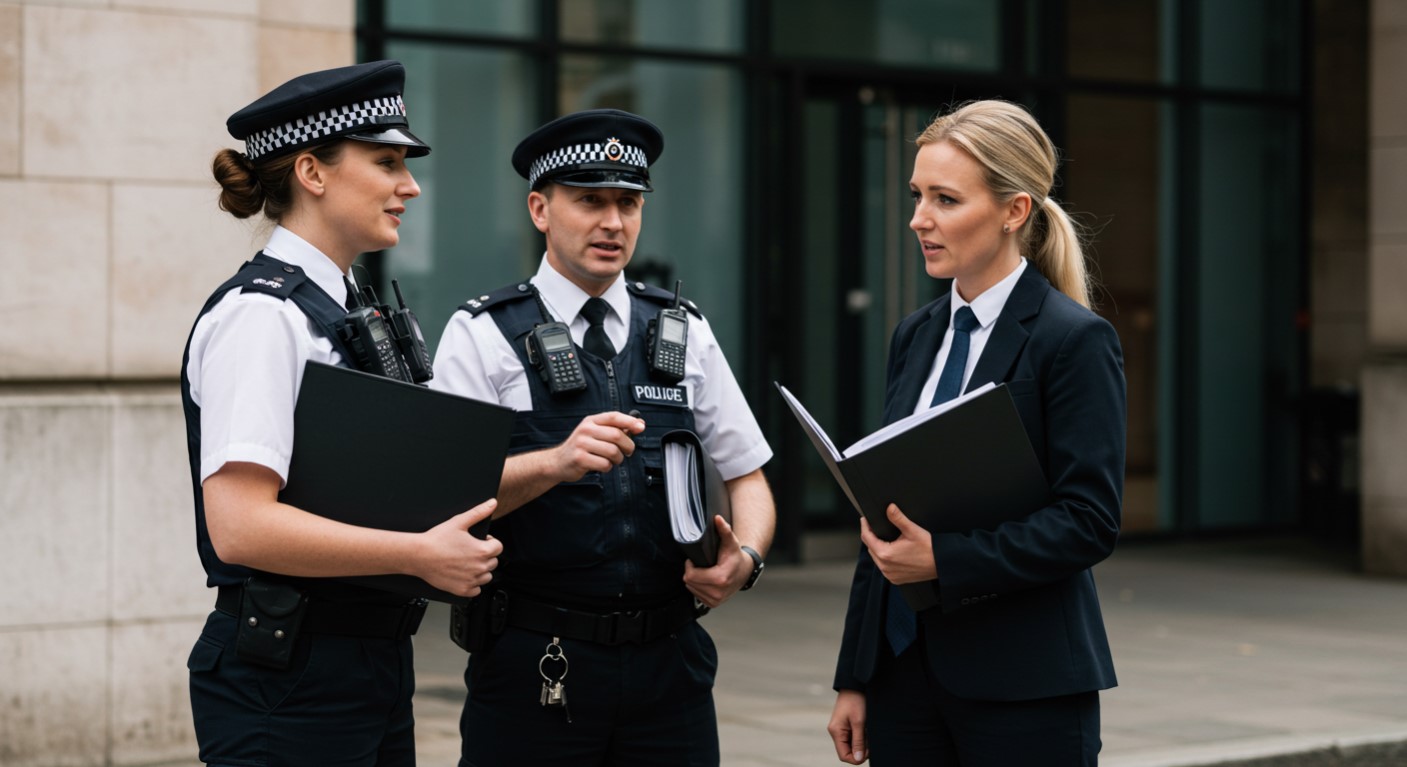What Constitutes a Violent Crime Under UK Law?

What Constitutes a Violent Crime Under UK Law?
Violent crime is a serious issue that affects societies worldwide, including the United Kingdom. Understanding what constitutes a violent crime under UK law is essential for promoting safety and justice.
In this article, we will explore the legal definition of violent crime, different categories and types of violent crimes, the statutory framework surrounding violent crime in the UK, and how these crimes are reported and investigated. We will discuss measures and strategies aimed at preventing violent crimes.
By delving into these topics, we can gain a comprehensive understanding of the nature of violent crimes and the legal framework in place to address them.
Defining Violent Crime

Defining violent crime is crucial in understanding the scope of criminal offences in the UK. Under UK law, violent crime refers to offences that involve physical force or the threat of force against another person.
These offences can include assault, murder, robbery, and sexual offences. They are categorised as violent because they result in harm, injury, or the fear of harm.
The definition of violent crime helps to guide law enforcement, legal professionals, and policymakers in addressing and preventing such offences.
Understanding the specific nature of violent crimes enables effective measures to be implemented to ensure public safety.
What is the Legal Definition of Violent Crime?
The legal definition of violent crime refers to any act that involves the use or threat of force against another individual or property.
It includes offences such as homicide, assault, robbery, and sexual offences. Under UK law, violent crimes are categorised based on the severity and nature of the act. It is important to understand the legal definition to accurately identify and report these crimes.
The legal definition of violent crime serves as a basis for the enforcement of relevant laws and legislation, as well as determining appropriate punishments and sentencing for offenders. By understanding the legal definition of violent crime, individuals and authorities can effectively address and prevent violent crimes in society.
Categories of Violent Crime
When discussing categories of violent crime in the UK, it is crucial to have a comprehensive understanding of the various types of offences that fall under this classification. These defined categories encompass the following:
1. Murder/Manslaughter: This pertains to the unlawful taking of another person’s life, which can be further classified as either murder or manslaughter.
2. Assault: Assault entails intentionally causing physical harm or instilling fear of physical harm in another individual.
3. Robbery: Robbery transpires when force or the threat of force is utilised to unlawfully acquire property from someone else.
4. Sexual Offences: These include heinous crimes such as rape, sexual assault, and other forms of non-consensual sexual acts.
By delineating these categories, we can effectively identify and address the various types of violent crimes, each carrying its own set of legal consequences.
Types of Violent Crimes

When it comes to understanding the different types of violent crimes in the UK, we need to dig deeper into the realm of law.
Murder/manslaughter is a serious crime involving the unlawful killing of a person. It encompasses various types, including murder, manslaughter, and infanticide.
| Type of Homicide | Definition | Punishment |
|---|---|---|
| Murder | Intentional killing with malice aforethought | Life imprisonment |
| Manslaughter | Unlawful killing without intent | Up to life imprisonment |
| Infanticide | The killing of a newborn by the mother suffering from a mental disturbance | Up to life imprisonment |
Assault
Assault is a common form of violent crime that involves intentionally causing physical harm or the apprehension of immediate harm to another person. It includes acts like punching, kicking, or using weapons to threaten or harm someone. In the UK, assault is categorised into different levels based on the severity of the harm caused.
| Level of Assault | Description |
|---|---|
| Common Assault | Minor physical contact, threats, or verbal abuse without causing significant harm. |
| Actual Bodily Harm (ABH) | Inflicting injuries that are more than transient or trifling, but not resulting in serious injuries. |
| Grievous Bodily Harm (GBH) | Causing serious injuries, which may result in permanent disfigurement, loss of a bodily function, or endangering life. |
It’s important to note that assault is a serious offence in the UK and is punishable by law.
Robbery
Robbery is a serious crime in the UK that involves the theft of property from a person or location through the use of force or threat. Here are some key points to consider about robbery:
- Definition: Robbery is legally defined as the act of taking someone else’s property through the use of force or by causing the person to fear immediate harm.
- Elements of There are three main elements that must be present for an offence to be considered robbery: the act of stealing, the use of force or threat, and the intention to permanently deprive the victim of their property.
- Punishment: Robbery is a serious offence and carries significant penalties under UK law. Offenders can face imprisonment for a term of up to life, depending on the severity of the offence.
- Prevention: To prevent robbery, individuals should take precautions such as being aware of their surroundings, avoiding high-crime areas, and securing their property.
Sexual Offences
Sexual offences are a critical issue within the realm of violent crime in the United Kingdom. They encompass a variety of offences, such as rape, sexual assault, and indecent exposure.
It is crucial to comprehend the legal definition of sexual offences and the categories they fall under. The statutory framework outlines the relevant laws and legislation, as well as the punishments and sentencing for these crimes.
Reporting and investigating sexual offences is a vital step in ensuring justice is served. In terms of prevention, implementing comprehensive measures and strategies is essential to combating these offences and creating a safer society.
Statutory Framework of Violent Crime in the UK

When it comes to understanding violent crime in the UK, it’s crucial to explore the statutory framework in place. In this section, we’ll dive into the relevant laws and legislation that define what constitutes a violent crime. From there, we’ll uncover the punishments and sentencing guidelines that offenders may face.
Relevant Laws and Legislation
When discussing relevant laws and legislation related to violent crimes in the UK, it is crucial to consider the legal framework in place. This legal framework incorporates a range of laws and regulations that precisely define and penalise various types of violent crimes.
For instance, the Offences against the Person Act 1861 provides provisions specifically aimed at crimes like assault and robbery. Addressing sexual offences, the Sexual Offences Act 2003 plays a vital role.
These necessary laws outline the prescribed punishments and sentencing guidelines applicable to individuals who are convicted of committing violent crimes. Gaining a comprehensive understanding of these pertinent laws and legislation is of utmost importance in effectively prosecuting offenders and ensuring justice for the victims of violent crimes.
Punishments and Sentencing
Punishments and sentencing are integral components of the justice system in the UK. In the realm of this topic, the following essential points should be noted:
- Individuals who are convicted of violent crimes can potentially face a variety of punishments and sentencing, which may include imprisonment, community service, fines, or a combination thereof.
- The severity of the punishment is contingent upon factors such as the nature and gravity of the offence, the offender’s criminal history, and any aggravating or mitigating circumstances.
- Within the sentencing process, judges are provided with guidelines that assist them in determining appropriate punishments and sentencing. These guidelines consider the extent of harm caused, the level of culpability, and other pertinent factors.
- When it comes to cases involving severe violent crimes like murder or rape, a life sentence with a specified minimum term is a potential punishment and sentencing, and parole may only be considered after that minimum term is served.
- The parole board evaluates the eligibility of offenders for release based on several factors, including their conduct during imprisonment and the potential risk they pose to society.
- Measures are taken to maintain consistency and fairness in the practice of punishments and sentencing. Individual judges possess the discretion to consider the unique circumstances of each case.
Ultimately, the aim of punishments and sentencing for violent crimes in the UK is to deter offenders, safeguard the public, and uphold the principles of justice.
Reporting and Investigating Violent Crimes
Reporting and investigating violent crimes is a crucial aspect of maintaining law and order in any society. The process of reporting and investigating violent crimes plays a vital role in ensuring the safety and well-being of the community.
Effective reporting and investigation procedures are necessary to document incidents accurately, allowing law enforcement agencies to respond promptly to these grave matters. Thorough investigations are conducted to gather essential evidence and eventually identify the perpetrators, ensuring that they are brought to justice.
Victims and witnesses are encouraged to come forward and provide detailed information that aids in these processes. Collaboration between law enforcement agencies, forensic experts, and community members is key to successfully solving violent crimes.
This collective effort leads to timely reporting, thorough investigations, and ultimately contributes to both the closure of victims and the overall safety of society.
How to Report a Violent Crime?
To report a violent crime in the UK, follow these steps on how to report a violent crime:
1. Ensure your safety: If you are in immediate danger, dial emergency services (999) without hesitation.
2. Contact the police: Call the non-emergency number (101) to report the crime and provide them with all relevant details.
3. Provide accurate information: Be prepared to describe the incident, including the date, time, location, and any identifying information about the perpetrators.
4. Preserve evidence: If possible, take photos or videos of the scene, keep any relevant documents or messages, and note down any witnesses.
5. Obtain a crime reference number: The police will provide you with a unique crime reference number, which you should keep safe for future reference.
6. Seek support: If you require emotional or practical support on how to report a violent crime, contact local victim support organisations or the National Domestic Abuse Helpline.
Remember, reporting a violent crime is crucial in protecting yourself and others in your community.
Process of Investigation
- The process of investigating violent crimes in the UK involves several steps to gather evidence and identify perpetrators, including:
- Crime Scene Examination: Forensic specialists collect and analyse physical evidence such as fingerprints, DNA, and fibres as part of the investigation process.
- Interviewing Witnesses: Investigators interview individuals who may have witnessed the crime to gather information and statements, thus carrying out a crucial step in the process of investigation.
- Reviewing Surveillance Footage: CCTV footage and other video recordings are carefully reviewed as an essential part of the investigation process to identify suspects or gather information about the crime.
- Collecting and Analysing Digital Evidence: Investigators meticulously examine electronic devices to uncover evidence like emails, text messages, or social media activity related to the crime, effectively incorporating this step into the process of investigation.
- Post mortems and Medical Examinations: In cases involving homicides, medical professionals conduct post mortems to determine the cause of death and gather additional evidence, playing a vital role in the process of investigation.
- Collaboration with Forensic Experts: Investigators work closely with forensic experts throughout the investigation process to analyse evidence and connect it to the crime scene or suspect, highlighting the importance of this collaborative step in the process of investigation.
By diligently following these steps, investigators can build a strong case and bring perpetrators to justice, demonstrating the significance of the process of investigation in solving violent crimes in the UK.
Preventing Violent Crimes

In the realm of crime prevention, let’s dive into the world of preventing violent crimes. Discover the powerful measures and strategies employed to curb the occurrence of these acts.
Measures and Strategies to Reduce Violent Crimes
- Community Engagement: Implement measures and strategies that foster strong community relationships and encourage active participation in crime prevention.
- Education and Awareness: Increase public awareness about the consequences of violence through education campaigns and community events.
- Early Intervention Programs: Provide support and resources to individuals at risk of engaging in violent behaviour, such as mentoring programs or counselling services.
- Addressing Socioeconomic Factors: Tackle underlying socioeconomic issues like poverty, unemployment, and inequality, which can contribute to violence.
- Law Enforcement Collaboration: Enhance collaboration between law enforcement agencies to improve response times, intelligence sharing, and coordination efforts.
- Gun Control Measures: Implement stricter regulations on the sale and possession of firearms to reduce access to weapons used in violent crimes.
- Targeted Policing Strategies: Develop proactive policing strategies that focus on high-crime areas and specific offender groups.
- Victim Support Services: Enhance support services for victims of violent crimes, including counselling, legal assistance, and financial aid.
- Restorative Justice: Promote restorative justice practices that prioritise rehabilitation and reconciliation for both offenders and victims.
Frequently Asked Questions
What constitutes a violent crime under UK law?
Under UK law, a violent crime encompasses various offences where someone physically hurts or threatens to hurt another person. This includes crimes involving physical harm, use of weapons, or clear intent to cause physical harm, regardless of whether a physical injury occurs. Examples include assault, gun and knife crime, sexual violence, domestic violence, hate crimes, robbery, and murder or manslaughter.
What are the statutory offences related to violent crimes in England & Wales?
In England & Wales, the Offences Against the Person Act 1861 covers most violent offences. These include assault occasioning actual bodily harm, malicious wounding or infliction of grievous bodily harm, and wounding and causing grievous bodily harm with intent. These offences involve varying degrees of physical harm and intent to cause severe damage or injury.
Can a violent crime involve emotional or psychological harm instead of physical harm?
Yes, a violent crime can involve emotional or psychological harm, known as psychiatric harm, under UK law. For example, assault occasioning actual bodily harm is committed when an individual’s conduct causes physical or psychiatric harm to a victim, irrespective of intent. This recognises that harm can extend beyond physical injuries.
Are common law offences included in the definition of violent crimes?
Yes, common law offences such as assault and battery are also considered violent crimes. Common law assault does not require physical harm but includes actions that make a victim fear harm. Battery, on the other hand, involves the intentional and unlawful touching of another person without their consent.
What criteria need to be proven to establish guilt for a violent crime?
Each offence, whether statutory or common law, has specific criteria that must be proven to establish guilt in a criminal trial. These criteria may include demonstrating the intent to physically harm the victim, the occurrence of physical or psychiatric harm, or the lack of consent for physical contact in the case of battery.
Should I engage a lawyer if I’m facing criminal charges related to a violent crime?
Facing criminal charges related to a violent crime can be a daunting time. It is highly recommended to engage a lawyer who specialises in criminal litigation to navigate the complex legal procedures. A specialised lawyer can provide essential guidance, protect your rights, and ensure the best possible defence strategy is employed.
Notice: Informational Content Disclaimer
The content provided on this website, including articles, blog posts, and other informational materials, is intended for general informational purposes only. It is not intended as, and should not be considered, legal advice.
Visitors to this website should be aware that the information presented here is not a substitute for seeking legal advice from a qualified solicitor or legal professional. Each individual's legal situation is unique, and the information provided may not be applicable to specific circumstances.
If you require legal advice or have specific legal questions, we encourage you to contact us directly. Our experienced team of solicitors is here to assist you with your legal needs and provide tailored advice to address your concerns.
Please be advised that any communication through this website, including the use of contact forms or email, does not create a solicitor-client relationship. Confidential or time-sensitive information should not be sent through this website. To establish a solicitor-client relationship and discuss your legal matters in detail, please contact us for a consultation.
We strive to provide accurate and up-to-date information, but we make no representations or warranties regarding the accuracy, completeness, or suitability of the information contained on this website. We shall not be liable for any reliance placed on the information provided herein.
Thank you for visiting our website. We look forward to the opportunity to assist you with your legal needs.




